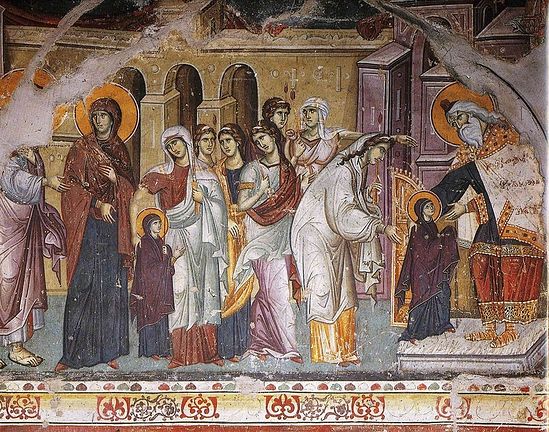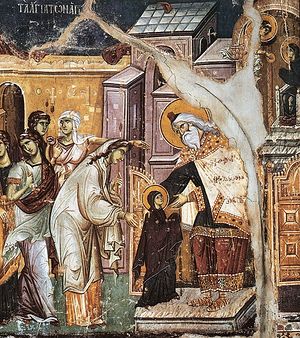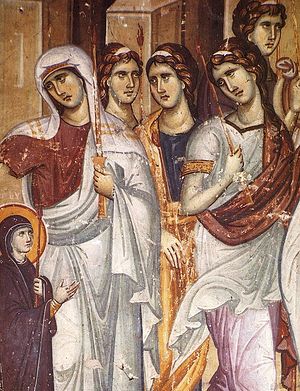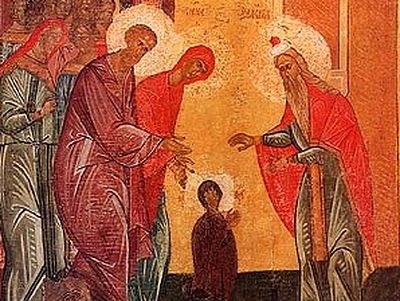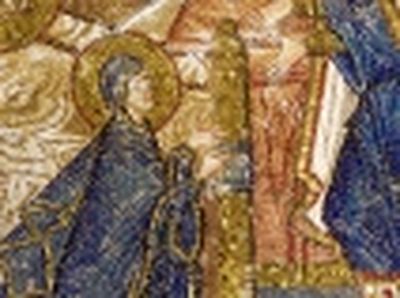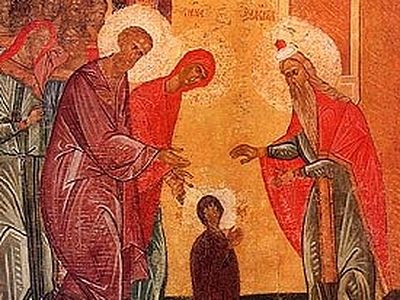Hearken, O daughter, and see, and incline thine ear; and forget thine own people and thy father’s house. And the King shall greatly desire thy beauty,1 for He Himself is thy Lord, and thou shalt worship Him.
Ps. XLIV: 9-10
God is wondrous in His ways, for in order to make blessed the being that comes from Him with a most exalted and incomprehensible blessedness, He from the ages deigned to unite His own nature with the nature of man, in the Person of His Only-Begotten Son—thus through Him to extend this union also to the fullness of the Church, which, according to the law of incarnation, is His body, and in this manner dissolving and as if mutually leveling all divinity with all lowly things, That in the dispensation of the fullness of times (Eph. 1:10), as the apostle says, When all things shall be subdued unto him, then shall the Son also himself be subject unto him that put all things under him, that God may be all in all (1 Cor. 15:28). This great resolution of the eternal counsel, or, according to the Apostle, this mystery, although it hath been hid from ages and from generations, is now made manifest also to his saints (Col. 1:26); and the Holy Spirit nevertheless revealed even this very revelation, which bears seven seals, to His mystics, and through them to all humankind to the extent of its gradually growing understanding obligating it to match up to and facilitate its fulfillment. Thus did one of the Prophets, who saw mankind in the past days of its infancy and under the guardianship of the law growing to the fullness of its years, when it was obligated to become capable of its task of being betrothed to Divinity and giving birth to a timeless Child, portrays the Son of God as the King approaching the wedding. And taking upon himself the role of the bringer of the bride, or friend of the bridegroom, the Prophet as if impatiently convinces human nature not to further postpone this blessed union by betrayal and insubordination, but to commit itself to it through sincerity and faithfulness. Hearken, O daughter, and see, and incline thine ear; and forget thine own people and thy father’s house. And the King shall greatly desire thy beauty
Long did this Divine voice call in the Church as in the desert, and apparently did not find a hearkening ear. Humankind did not have the boldness to triumphantly go forth to meet the Divinity. What would have happened to us had the heart of the blessed Virgin Mary not opened to the incomprehensible word of the incarnation, had her boundless dedication to God’s will not responded to the heavenly messenger,2 Behold the handmaiden of the Lord: be it unto me according to Thy will (Lk. 1:38)? She entrusted herself to the King’s desire without holding anything back—and the betrothal of the Divinity with the human race was fulfilled forever.
From this we Christians can see how such an apparently personal event—the entry into the temple and consecration to God of a three-year-old maiden—becomes the subject of triumph throughout the Church. This venture of the yet infant bride of God constitutes the beginning of her betrothal to the Holy Spirit, and therefore, in a certain sense, the first pledge of all mankind’s betrothal to the Divinity. True, this mystery was to be deeply hidden within her for the time being, like a flower in its seed; but in order to show the perfection of its ways, Providence often precedes its essential actions with certain significant events that give us some understanding of the future. And pious tradition also tells us that the Most Holy Virgin’s entrance into the temple had already been proclaimed by those prophetic words: hearken, O daughter, and see…
Now, in the days of fulfillment of the ancient beginnings and preceding signs, do you wish to see more clearly the glory of the present solemnity? Then follow the Prophet’s command. The virgins that follow after her shall be brought unto the King (Ps. XLIV:13. Do you not now see that the leading of the Most Holy Virgin to the king of Kings is the beginning of a great, solemn procession, in which all pure, chaste souls shall follow after her; that the present solemnity, by the Church’s intention, is a part and continuation of this great procession; that those who wish to participate in the present solemnity must unite themselves to it with a solemn procession, arraying themselves accordingly in the image of the great Leading Personage—the virgins that follow after her?
Lest we Christians become hard-hearted, and in this sacred procession remain no more than idle spectators of another’s feast, let us address our souls with this prophetic call: Hearken, O daughter, and see, and incline thine ear; and forget thine own people and thy father’s house. And the King shall greatly desire thy beauty, for He Himself is thy Lord, and thou shalt worship Him.
And first of all, Christian soul, recognize here your eternal right by which you belong the King of kings, and be led unto Him in submission and love. And the King shall greatly desire thy beauty, for He Himself is thy Lord.
It would seem strange in the human kingdom if someone were to enter a king’s house, and in the king’s presence to investigate his rule over his subjects. Wouldn’t there also be a certain audacity if in this house, and in this, albeit invisible, yet nevertheless close and inalienable presence of the King of kings, one were to judge and gainsay His eternal sovereignty over us? But what can be done with people who revere human grandeur, but despise dominion, and speak evil of dignities (Jude 1:8) of God? Don’t so many arrogant thoughts, so many self-willed desires, so many deeds done in forgetfulness of God speak louder than those words with which David rebukes the deceitful lips and the tongue that speaketh boastful words, which have said, Our tongue will we magnify, our lips are our own. Who is lord over us? (Ps. XI:3-4)? O, if only we would at least silence a little this outrageous cry by the confession and perception of God’s rule over us!
God is our Lord by right of His creation; Lord by right of His image in us; Lord by right of His redemption; Lord by right of His unceasing guardianship and grace-filled providence.
God is our Lord by right of His creation. If we respect our own home that we build, or the garden that we plant, then doesn’t God beyond comparison have a greater right to dispose of everything we have and are, as His own possession? If the work of our hands could contend with us over our power with them, like some of us would like to contend with God over the limits of His sovereignty over us, then our house could say that we did not create the wood and stones we live in; and our garden could say that we did not grow the fruits that we gather. For what hast thou, O man, that thou didst not receive (1 Cor. 4:7) from God? Forego for even a moment the gifts of Him Whose sovereignty over you you would like to curtail; return what you have received—and what remains? Nothing; and what is even worse than nothing—the sin that destroys God’s creation!
God is our Lord by right of His image in us. As we place our stamp on either things as we consider our property or things that we wish to hide from others, so has God stamped man with His image, as His property, which no being can dare to claim, and as a manuscript that no one can open besides the Only Begotten Son of God. Although man has broken this sacred seal, unsheathed the mystery hidden within himself of knowledge of good and evil, and sold the Divinity’s property for sin, there is still preserved in human nature a certain, let us say, trace of the Divine stamp; a certain remainder of God’s image. It is preserved in order that by this sign, man might be reclaimed by God and marked for Him. In man, the pure image of God was the source of blessedness; in fallen man it is the hope of blessedness. It is the very foundation of human nature, which although now covered over with dust and hidden in the earth, nevertheless upholds the entire building. So that we might better understand our relationship with God through His image in us, let us imagine the image of a body that with the help of the light around him marks its shadow on the ground. What would this shadow be without the body and the light? Without the power and light of God it is a man of dust!
God is our Lord by right of redemption. It happens that when we wish to keep our favorite property as our own when someone contends for it, we agree to acquire it once again by purchasing it; and we sacrifice other property to the unjust pretender in order to ensure that we have possession of what we love. Thus did God’s infinite love in a wondrous manner increase His eternal rights to us, in the unparalleled matter of our redemption. Man did not want to belong to God; he stole himself from God, refused God’s sovereignty, and dreamed of becoming a lord and god. The sacrilegious and seditious robber is convicted by the unbiased judge, sentenced and committed to eternal death. But love does not want to lose man. It undertakes to reclaim him again from hell more surely than before. It redeems the criminal from the curse of the law (Gal. 3:13); and how? By making itself a curse; it reacquires what had be sold to sin. And at what price? Not as silver and gold; But with the precious blood of Christ, as of a lamb without blemish and without spot (1 Pet. 1:18-19). O, the unfathomable sovereignty of love, which, in order take us possession, gives itself to us, and acquires us in order to give us everything! Christians! The Lord could not do greater good for us than this: Ye are not your own (1 Cor. 6:19).
God is our Lord by right of His unceasing guardianship and grace-filled providence. Calling forth man out of nothing, his exaltation through the image of God and restoration of the fallen comprise, in the opinion of the sons of men, God’s ancient right to reign over us, which we can honor more with reverent remembrance rather than perceive in force and action. But what does the Son of God say? My Father worketh hitherto, and I work (Jn. 5:17). There is no past for the eternal—it is all always present. All exists only by the unceasing action of He that is. Man can abandon his work; inasmuch as he does not create but only implements what already is. But if God were only to turn His gaze from His creations, they would cease to exist. When Thou turnest away Thy face, they shall be troubled. Thou wilt take their spirit, and they shall cease3 (Ps. 103:30-31). Need we seek far for Thee, Lord? If we only do not disappear, this is already a sign that Thy face is turned to us. Does a pure desire burn in us? Do we do good works? It is God which worketh in you both to will and to do of His good pleasure (Phil. 2:13). Does a good thought arise? Not that we are sufficient of ourselves to think any thing as of ourselves; but our sufficiency is of God (2 Cor. 3:5). Have we escaped dangers, have sorrows dissolved into consolation, or temptations been conquered? God … will not suffer you to be tempted above that ye are able; but will with the temptation also make a way to escape, that ye may be able to bear it (1 Cor. 10:13). O, how we amazed we Christians would be every minute if only we were able to penetrate and discover the mysterious traces of God’s rule in everything that happens to us and surrounds us!... Once the prophet Elisha, wanting to soothe the youth’s faintheartedness when he feared the enemies, prayed, Lord, open, I pray thee, the eyes of the servant, and let him see. And the Lord opened his eyes, and he saw: and, behold, the mountain was full of horses, and there were chariots of fire round about Elisha (4 Kings 6:17). If even now faith would open the eyes of our spirit, we would see all around us and all the heavenly powers moved to guard our safety and with us war against the kingdom of darkness—so! All the heavenly powers; for, Are they not all ministering spirits, sent forth to minister for them who shall be heirs of salvation? (Heb. 1:14). Even the one who does not dare, who does not believe in anything that he can’t touch—even he, when constantly watching all events, like Thomas will not have to wait long in order to feel the closeness and confess the truth of God and Christ’s omnipresent sovereignty: My Lord and My God (Jn. 20:28).
The Lord and Master is so powerful, so benevolent, so near to us. What is not in His power to demand from His slaves, whose fate He holds in His hand, and who in Him alone live and move and have our being (Acts. 17:28)? What yoke placed on us by Him would we dare to call burdensome to our freedom? What tribute sought by Him could exceed His rights over us? What sacrifice is sufficient for Him? If He were to say to us that He wishes to take everything back from us that He ever gave us, what could we answer Him other than, “Thy will be done, Lord, for we did not have any right at all to even one grain of Thy gifts, nor even to one moment of existence”? But God does not place upon us any yoke and burden other than the easy and light; He seeks no tribute other than our open arms to receive His gifts; He wants no sacrifice and whole burnt offering, as He is satisfied with His own eternal sacrifice of His Son for us. And this Son, Who at such a great price acquired the right to reign over us, rules us only for us, and His limitless reign, we shall dare to say to the glory of His goodness, is only a many-sided service of His own creatures. What then, finally, does this King want from his slaves? He desires, says His messenger to our souls, the King shall desire thy beauty. Your Savior desires to espouse (2 Cor. 11:2), to betroth you to Himself as a pure virgin for ever (Hos. 2:19). As a bridegroom will rejoice over a bride, so will the Lord rejoice over thee (Is. 62:5). Could you object to this blessed desire for you?
And so, Hearken, O daughter, and see, and incline thine ear; and forget thine own people and thy father’s house. And the King shall greatly desire thy beauty,4 for He Himself is thy Lord, and thou shalt worship Him. Learn, Christian soul—and this is the second subject of the prophetic proclamation—learn faithfulness, which should bring you to the good will of the King of kings, as his only desire is the beauty in us, who have no beauty of our own whatsoever.
Hearken, O daughter, and see. But the Prophet does not explain what we should hear, or where we can see the beloved Bridegroom of the soul. This is something that cannot be said once and for all, for everyone. There isn’t one voice for every hearing, nor is there one vision for every gaze. Sometimes the Lord appears to the soul when it was not expecting Him: I became manifest to them that asked not for me; I was found of them that sought me not I said, Behold, I am here, to a nation, who called not on my name (Is. 65:1). But sometimes He keeps silence and is not found by the one who seeks and calls after Him: I will rise now, and go about in the city, in the market-places, and in the streets, and I will seek him whom my soul loves: I sought him, but I found him not (Songs 3:2). But do not despond because of this, daughter of His mercy—only hearken, heed unceasingly every sign of His presence, and see, look over all His paths, Seek ye the Lord, and when ye find him, call upon him; and when he shall draw nigh to you (Is. 55:6).
Hearken, O daughter, and see. Only two senses out of five leave to you a herald of the will of the King of kings. Begin to go out like Lot from these five cities that must soon perish. Leave the realm of the senses, having previously renounced those that are more fleshly and coarse. Touch not; taste not; handle not (Col 2:21) in desire and pleasure and satiety, but only out of need and infirmity of the flesh. Senses satiated with pleasures sleep outside the Heavenly Bridal chamber and do not hear His voice; the oil in their lamps burns out, and they do not see His face.
Hearken, O daughter, and see. Be attentive! There are many, magnificent voices that strike the inner hearing; but not all of them are the voice of the Lord God walking in paradise—even the serpent was allowed to speak in paradise. There are many, bright forms that meet the spiritual eye, but not all of them are the true light of Christ; for Satan himself is transformed into an angel of light (2 Cor. 11:14). Learn where you should turn, so as not to be lured away by phantoms: Incline your heart, with David, in testimonies (Ps. 118:36) of the Lord. Be not carried about with divers and strange doctrines (Heb. 13:9). We have also a more sure word of prophecy and apostolic word; whereunto ye do well that ye take heed, as unto a light that shineth (2 Pet. 1:19).
Having begun our spiritual procession to the heavenly Bridegroom and preserved our faithfulness to Him, we can for a long time still be held back from Him by the passions of our hearts. But we should be freed from these bonds also: Forget thine own people and thy father’s house. Is this possible? asks the passionate soul. But is there any question about this, when the same God commands through the law of spousal love that a man leave his father and mother (Gen. 2:24)? Doesn’t the loving heart then become the interpreter and protector of this seemingly strict law? Is what is possible for love of creature impossible for love of God? Shouldn’t the latter be incomparably stronger than the former? If one love of creature can be sacrificed for another love of creature, then could love of God offer a lesser sacrifice, as all generations have love to themselves and others? And can the divine Bridegroom offer lesser demands to those who desire to be betrothed to Him, like this: If any man will come after me, let him deny himself, and take up his cross, and follow me (Mt. 16:24). He that loveth father or mother more than me is not worthy of me: and he that loveth son or daughter more than me is not worthy of me (Mt. 10:37). There should be no barrier, no intermediary. No shadow should fall between Him and the soul. My beloved to me, and I to him (Songs 2:16).
Blessed are you if you understand and sing this song, Christian soul. Then the King will greatly desire your beauty, and show you the treasure of His love. I love them that love me (Prov. 8:17).
But also take care, O daughter of good will, that you not stumble in approaching your King. Look with trembling at the glory that He promises you; and consider that you cannot earn it by anything; but the slightest unfaithfulness can deprive you of it forever. Remember the last instruction of him who leads the bride to the King:5 and thou shalt worship Him. Pray unceasingly to the One Who fulfills all your good desires, and when he crowns you with mercy and compassion, fall at His feet in humility. Let the loving heart, in the words of the blessed one,6 be covered with the fear of the Lord in humility of wisdom, that you might not become exalted and fall away from the All-Merciful One.
May this true path and steady procession from the world to God and from darkness to light lead the virgins to the heavenly King of our souls, Christians, following after most blessed Virgin led into the temple today; and they shall be led some time into the eternal temple of the King made without hands, through His grace, compassion, and love for mankind. Amen.
From the Works of Metropolitan Philaret of Moscow. Homilies and Speeches, (Moscow, 1803-1821), 1:204-212.
